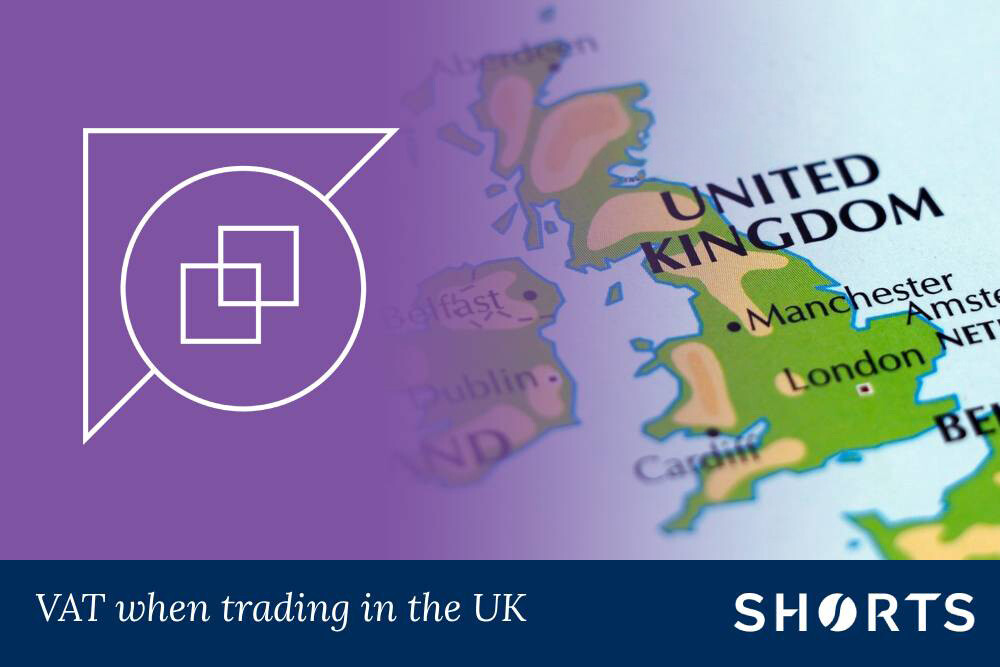
When a non-UK business starts trading in the UK, several key VAT (Value Added Tax) issues must be considered to ensure compliance and optimise tax efficiency. In this detailed guide, we will run through the main VAT-related aspects to be aware of.
VAT Registration
The UK threshold for VAT Registration
Non-UK businesses with no UK establishment must register for VAT if they make taxable supplies in the UK, regardless of turnover.
However, if a non-UK business has a UK establishment, it must register for VAT once its taxable supplies exceed the registration threshold (currently £90,000) in a 12-month period or if taxable sales in the next 30 days are expected to exceed this threshold.
Certain activities, such as importing goods into the UK, may require immediate VAT registration.
Voluntary Registration
Even if the business does not meet the registration threshold, it may choose to voluntarily register for VAT to reclaim VAT on UK purchases and enhance its credibility with UK customers. Once it is VAT registered, the business must charge VAT on sales (if applicable).
Place of Supply Rules
Goods
VAT treatment for goods depends on whether they are sold within the UK, imported into the UK, or exported from the UK. Imports may incur import VAT and customs duties, while exports from the UK may be zero-rated for VAT purposes.
Services
The place of supply rules determines the VAT treatment of services.
- Under the general rule, VAT on B2B (business-to-business) services is typically applied in the country where the customer belongs.
- For B2C (business-to-consumer) services, VAT is charged in the country where the supplier belongs. If the supplier does not have a business establishment in the UK but their usual place of residence is the UK, they are deemed to be located in the UK for VAT purposes.
Import VAT and Customs Duties
Import VAT
When goods are imported into the UK, import VAT is generally due at the point of entry. The rate is usually the standard UK VAT rate (20%), although it may differ for certain goods.
Customs Duties
Customs duties may also apply depending on the nature and origin of the goods.
Postponed VAT Accounting
Non-UK businesses can use Postponed VAT Accounting to defer payment of import VAT until their next VAT return, which helps improve cash flow.
VAT Treatment of Online Sales
Distance Selling Rules
If goods are sold and delivered across borders to non-VAT-registered customers in the UK, the business may need to register for UK VAT and charge VAT on these sales.
Online Marketplaces
If selling through platforms like Amazon or eBay, the marketplace may be responsible for collecting and remitting VAT on sales to UK consumers.
VAT on Digital Services
VAT on Electronically Supplied Services
Non-UK businesses that provide digital services (such as streaming, software, or downloads) to UK consumers must charge UK VAT. Where the non-UK business does not have an establishment in the UK, it must register and charge UK VAT regardless of its turnover.
Reclaiming VAT
Input VAT Recovery
Non-UK businesses registered for VAT in the UK can generally reclaim VAT paid on business-related purchases (input VAT). However, certain conditions and restrictions apply.
VAT Refunds
Non-UK businesses that are not VAT-registered in the UK may still be able to reclaim UK VAT on certain expenses through the VAT refund scheme for non-UK businesses, provided they are registered for VAT in a different country.
Invoicing and Compliance
VAT Invoicing Requirements
Non-UK businesses must issue VAT-compliant invoices to UK customers, which include the VAT amount, VAT registration number, and other necessary details.
VAT Returns
VAT-registered businesses must submit regular VAT returns to HMRC (usually quarterly). This includes reporting output VAT (VAT on sales) and input VAT (VAT on purchases) and paying any VAT due.
Making Tax Digital (MTD)
VAT-registered businesses must comply with MTD rules, which require the submission of VAT returns using digital records and software.
Cross-Border VAT Issues
VAT on Exports
Goods sold from the UK to customers outside the UK may be zero-rated for VAT, provided the appropriate documentation supports the zero-rating.
VAT on Intra-EU Trade
Businesses trading between EU countries must adhere to cross-border VAT rules, including obtaining an EU VAT number and registering for VAT in an EU country and using schemes such as OSS (One Stop Shop) or IOSS (Import One Stop Shop).
Agency and Intermediary Arrangements
VAT on Agency Services
When a non-UK business operates through a UK-based agent or intermediary, the VAT treatment can vary depending on the specifics of the arrangement.
Penalties and Compliance Risks
Penalties for Non-Compliance
Failure to register for VAT, submit VAT returns, or pay VAT on time may result in penalties and interest from HMRC.
Compliance Reviews
Non-UK businesses should be aware that UK VAT officers can request routine compliance checks to ensure that you are paying or reclaiming the right amount of VAT.
Professional Advice
Given the complexity of UK VAT regulations, non-UK businesses are encouraged to seek advice from UK-based VAT consultants or tax advisers to ensure compliance and optimise their VAT position.

Lynne Gill
My area of expertise is land and property transactions but I have extensive knowledge of both domestic and international VAT and I love complex VAT queries. I have an Honours degree in Business Studies and a VAT legal and technical qualification from the Institute of Indirect Taxation.
View my articlesTags: VAT, International Taxes
